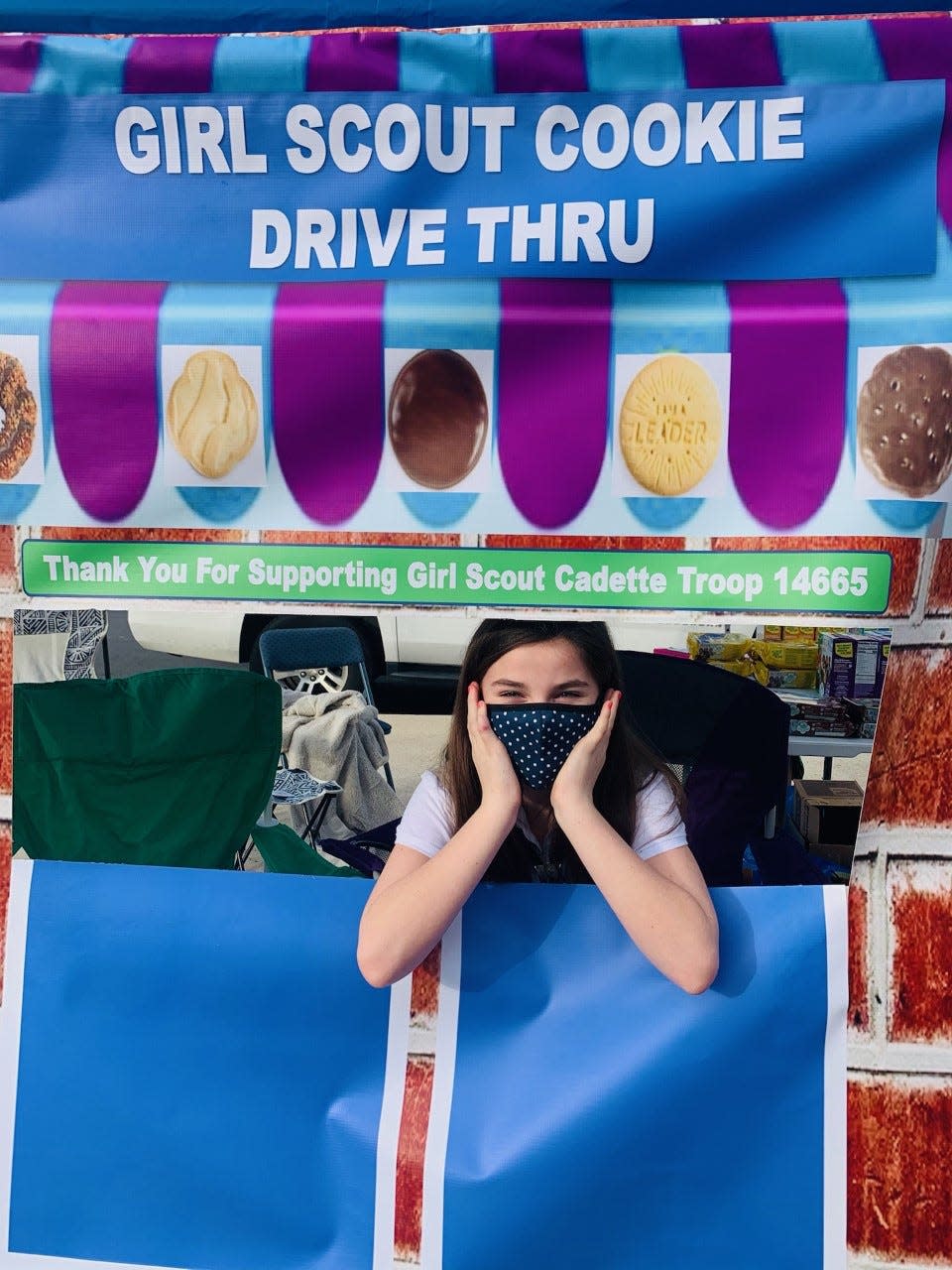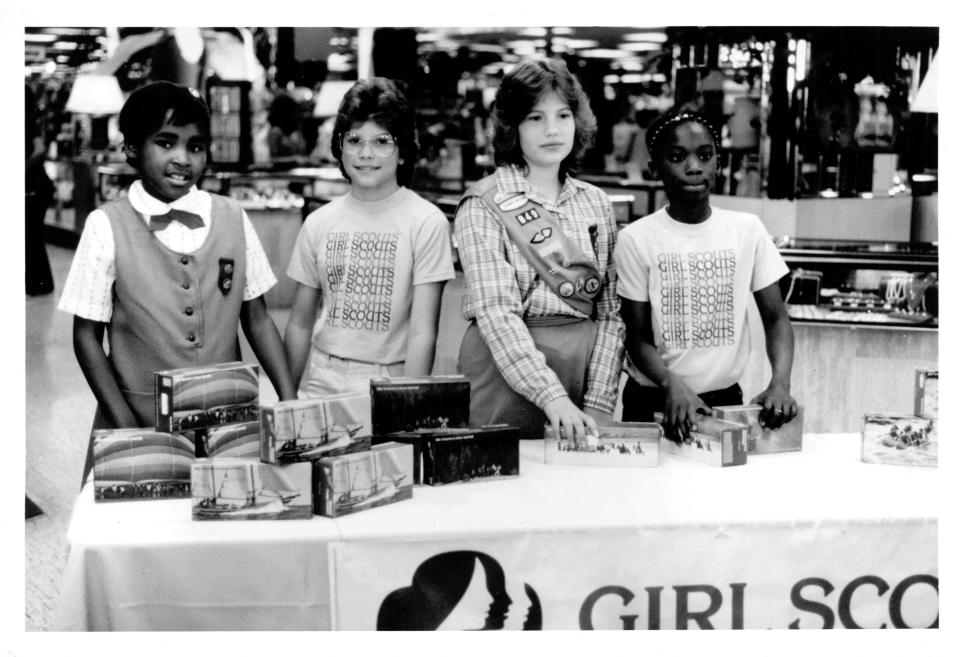A cookie and a cause: How Girl Scout Cookies went from cafeteria treat to national treasure
What started in an Oklahoma school cafeteria dessert has grown into one of the nation's most familiar fundraisers, but like everything else, Girl Scout Cookies have felt the pinch of the pandemic the past few years.
In the past two cookie selling seasons, councils had to navigate digital accessibility while handling the woes of the COVID-19 pandemic that affected sales. Despite the high demand for the cookies, and sales dipping below their $800 million average, the troops developed innovative plans, including drive-thru cookie stands and virtual cookie booths, to help ensure success.
But whether Girl Scouts are delivering cookies by drones or hauling them in the back of a Radio Flyer wagon, the experience provides a lasting impact, said Vallery Lomas, a former Girl Scout-turned-attorney who recently capitalized on her love of baking by releasing a cookbook, "Life Is What You Bake It."
"It made me comfortable with being able to sell things and market myself," said Lomas, who won the Great American Baking Show. "It is scary putting yourself out there because people can tell you 'No.' It’s an important thing to learn."

Favorite flavors: Which Girl Scout Cookies are most popular where you live?
History of Girl Scout Cookies
From a school cafeteria in 1917 to nationwide booths today, Girl Scout Cookies came a long way to what we know now as the most anticipated sale of the year.
The Mistletoe Troop in Muskogee, Oklahoma, started the bake sale with a few batches of homemade sugar cookies to fund troop activities.
The recipe for the cookies was put in the American Girl Magazine in July 1922 which drew in 2,000 Girl Scouts across the nation. Florence E. Neil, a local director in Chicago, calculated ingredient cost estimates and suggested the cookies be sold door-to-door.
By the 1930s, the organization hired commercial bakers and the cookies were sold nationwide.
World War II momentarily halted sales, but regained its traction in 1948 and eventually moved into malls.

Three cookie varieties were featured in the sales including the fan favorite Thin Mint, then-called "Cooky-Mints." The other two were Sandwiches and Shortbread. These have become today's top three flavors.
The 1980s and 1990s were the building years for the die-hard following we know today credited to a new logo, imaginative box design and tasty cookie additions. Over the years, we have seen some of our favorites come and go, but officials guarantee there's a flavor for everyone.
Special delivery: DoorDash will deliver Girl Scout Cookies to your house this year
The craze that swept the nation
Girl Scouts typically have about six-to-eight weeks to sell the cookies, which total about 200 million boxes a year, so scarcity helps explain some of their popularity, said Darrin Duber-Smith, a senior marketing executive at the Metropolitan State University of Denver.
"Whichever way one feels about the nonprofit's promotional efforts, legions of supporters anticipate this once-a-year event and enjoy the opportunity to give to a good cause while enjoying the very tangible benefits of eating cookies," Duber-Smith told USA TODAY. "This combination of giving and receiving is one of the things that make the promotion so effective."
Girl Scouts spend the leading months planning marketing strategies, goals and budgets to draw in the ample amount of consumers.
"A lot of the popularity and excitement really comes from the continued evolution and innovation we see every single year from girls. When the pandemic first started, there was a lot of uncertainty in how businesses would adapt to meet the needs of their customers," said Kelly Parisi, head of GSUSA communications.
In the 2021 season, scouts used drones to deliver orders, take orders through doorbell cameras and sell cookies via Instagram live. Customers continued to buy into the program but sales fell short in comparison to previous years.
Despite discontinuations, this year being the Thanks-a-lot cookie, customers will receive their favorites through new tactics. The cookie business has been an forever evolving business to satisfy the craze.
More than a cookie business
Every registered Girl Scout is allowed to participate in the cookie sell which is designed to instill key skillsets used in entrepreneurship: goal setting, decision making, money management, people skills and business ethics, according to the GSUSA website.
The Girls Scout Cookie business allows the girls to be empowered through autonomy. They create their own plans to execute. As young girls, whether they realize or not, they are setting up foundational skills that can used in other areas of their life which many alum can attest to.
Lomas was a practicing attorney until she realized her passion was in baking. After years of toiling with the idea, she took a leap of faith and pursued a full-time career in baking.
"Looking back and piecing together 'how did I get here,' there are so many roles that shaped me into the person I am that believes in herself. I am not selling cookies, but a cookbook about cookies. I am using all of those same strategies and believing I can do it," Lomas told USA TODAY.

While she credits her career switch to her unwavering passion for creating tasty treats as a safe haven and support from her family, she knows there are fundamentals she learned while being a Girl Scout.
The organization added new cookie business badges for this year's season as incentives and comprehensive tools for the girls.
"Earning one of the Cookie Business Badges demonstrates that Girl Scouts have developed specific skills while running their own business. Earning Cookie Business badges gives girls the chance to hone their skills and gain a deeper understanding of the world of business," Parisi explained.
The Girl Scouts cookie-selling business represents so many things. It gives the girls the power to make their own decision to support their troop while being a delectable goodie all of America can enjoy.
"It wasn’t that people had to get their Thin Mint fix, but they were supporting us. People were doing it for Girl Scouts,” Lomas said.
This article originally appeared on USA TODAY: Girl Scout Cookies annual sale draws in consumers for a cause
